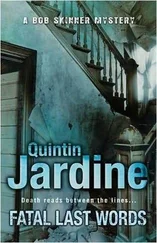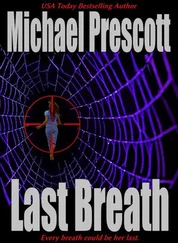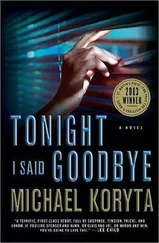He had two caving packs prepared, perfect twins, every tool in his own pack mirrored by one in the other. Julianne was not capable of using all the equipment, but still he’d outfitted her with the proper gear. Ropes, carabiners, and ascenders. Gloves, knee pads, elbow pads. A first-aid kit. Protein bars and glucose tablets and water bottles and an emergency blanket. Headlamps with fresh batteries.
He looked over all the gear, satisfied except for the missing tool, the one he never went into a cave — or anywhere, even aboveground — without: a Benchmade knife with black grips and a folding steel blade that was just a fraction under four inches in length. It was as close as he’d ever been able to come to the discontinued model that he’d carried for years and lost somewhere in Trapdoor in a transaction that was forever hazy — a knife in hand one moment, Sarah Martin’s sapphire necklace in hand the next. When he thought of being back there in the dark with Julianne Grossman at his side, he wondered if maybe he should leave the knife behind.
He thumbed it open, the blade extending with a soft snick, the grip perfectly balanced in his hand. His mouth was dry. When it came to this tool, Julianne would not need a matching version.
He put the knife in his pocket, clipped helmets to the packs, slung one pack over each shoulder, and turned and looked around the house. The rooms were hard to make out in the shadows but he knew them well and he thought that his time here had been mostly good. Of the homes he had known on the surface of the earth, this was probably the best of them. He stepped outside and walked to the truck and put the packs in the bed and was in the driver’s seat with the key in his hand when he stopped. He did not believe he would be returning to this place, and while he wasn’t one for sentimental gestures, he felt that he hadn’t left it quite right for the visitors who would soon descend on it. He left the truck and walked into the house and went upstairs. He pushed on the knee wall and watched it pivot open soundlessly. The seams were still flawless and there was not so much as a creak to the dowels. It was fine work and he wondered if anyone would appreciate that. He turned it until it was half open, and then he left the room and went back down the stairs and exited again. This time he remembered to leave the front door unlocked. If it was not unlocked, they’d kick it down, and Ridley had built the door and the frame himself and hated the idea of that beautiful wood splintering needlessly.
The roads had been plowed and salted and there was no fresh snow coming down but somehow his thin tires felt less secure on the road than they had only a day before. Only this morning, even. You could wear the rubber down for just so long before the wires started to show and then the withheld pressure you counted on to carry you along went from helpful to dangerous. He’d understood this since he was a boy and he was vaguely disappointed in himself for having allowed the tires to reach such a point, and in the winter, no less, when traction was critical and steady pressure was harder to hold. He’d gotten distracted somewhere along the line.
When he took the sapphire necklace out of his pocket, the stone was cold, and though he held it in his hand for most of the drive, it never warmed. Just before he reached Julianne’s house he reached up and looped the chain around the rearview mirror so that it dangled in the center of the cab. For a short stretch, it caught the reflected light off the snow and glistened beautifully, but then he had to turn the lights off and the color went with them.
He drove the last half mile in the dark and parked on the shoulder of the road where he was screened from her house by the trees. In all of his visits he had never seen her dog indoors, and that was a problem because she appeared to be a vigilant animal. Ridley had always appreciated the vigilance and the fact that she was clearly a den dog, always burrowing, digging deeper, a creature who wanted to crawl beneath. Those were fine things and he would hate to see any harm come to the dog, but all the same he slipped his knife free from his pocket as he approached.
He was twenty feet from the house when the dog began to bark, and Ridley gritted his teeth and snapped the blade open and then closed it again when the animal retreated. In his past visits, she would cautiously advance toward him and the fact that she would not tonight made him curious as to what she smelled on him. How did she know? It was fascinating to consider. If dogs could talk, people would say, but they were always referring to the idea that the dogs would reveal something stupid or humorous; they failed to grasp just how much their worlds would change if dogs could talk. You were exposed in front of a dog in ways you never considered. The moment you hit the door, your dog knew whether you felt anger or fear, whether you’d wept recently, fought recently, had sex recently — and whether that sex had been with your spouse. If dogs could talk. Yes, wouldn’t that be something? Ridley wondered how many people would have pet dogs in that world.
He went up the steps as the dog circled the porch and he knocked on the door with his left hand and opened the knife again with his right and held it so that the edge of the blade was facing forward. When Julianne opened the door he showed her the knife and said, “Please do not make me kill the dog.”
She had the security chain fastened but they both understood that would not hold as long as she would need it to.
“Don’t do this,” she said. Her voice so soft, so familiar. “Please do not do this.”
“Open the door.”
She opened the door. She was an intelligent woman and he was grateful for that.
As she stepped away from the door, words poured from her.
“Please sit so that we may talk about the things that you are feeling. There is a chance of more snow again tonight, did you hear? I have not seen so much snow in a winter in a long time, and if you would like to sit on the couch, obviously there is negative emotion with you tonight, the emotion that you have, feeling very negative, and those feelings are very valid, so if you would like to sit, you may. If you would like to sit and leave the cold outside and we could—”
Ridley grabbed her hair with his right hand, the knife tangling in the strands, and put his left hand over her mouth. Her words had been streaming at him in those unusual rhythms and with unusual thoughts, thoughts that did not match the situation. Ridley had studied enough to understand that this was one area where Julianne Grossman excelled. While she had weaknesses as a hypnotist, her ability with what was called neurolinguistic programming was remarkable. She jarred your expectations with thoughts and cadences and word choices, and eventually her suggestions ceased to feel suggestive and became more directive and then your mind belonged to her.
Ridley no longer wanted it to.
“You will have an opportunity to talk,” he said. She was not struggling. She was aware of the knife just behind her brain stem. “But I can’t allow you to have that now, because you are so good with words. You are so good at what you do. I respect that. You know that I have always respected that, don’t you?”
Her eyes were locked on his and there was fear in them but there was something else also and he said, “Do not let the dog inside.”
He had not turned to see the dog and he had not heard the dog but he knew that it was there and when she lifted her hand, he allowed the motion because the hand was for the dog and not for Ridley. There was an anxious whine from behind him and Ridley realized how close things had come to going very bad.
“Thank you,” he said. “Use the same hand to close the door.”
Читать дальше












